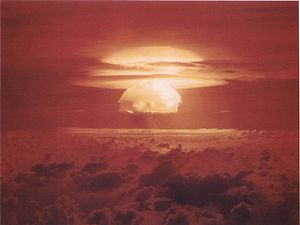In the summer of 2015 I attended a convention in the English countryside where I witnessed thousands of Muslims from around the world pledge allegiance to an Islamic Caliph; the mood of the faithful in attendance soon became somber upon mention of a war destined to engulf the entire globe.
At this point, you might be thinking, “Muslims are yet again threatening world peace,” but it was in fact a word of warning and a plea for sanity by the Caliph of the Ahmadiyya Muslim Community, Mirza Masroor Ahmad. Speaking to the faithful, he said that unless world powers conduct themselves carefully in global affairs they risk instigating a nuclear holocaust.
Justified by dubious religious explanations, Al-Qaeda and more recently ISIS have attempted or threatened to acquire weapons of mass destruction, despite Islam’s rejection of their use. The Quran is unequivocal in affirming that Muslims must never hold innocent people responsible for the crimes of others; nor should they defend themselves against an aggressor beyond the injury received. The rules of warfare established by the Prophet Muhammad also forbade burning as a means of corporal punishment and the targeting of women and children.
These represent some of the basic, transparent rules by which Muslims are religiously bound. Moreover, these are basic rules of warfare that are consistent with contemporary international law. Only twisted and sadistic minds could attempt to justify the targeting and murder of thousands of innocent lives through the medium of the Quran and the Prophet Muhammad’s teachings.
Clearly an honest reading of Islam’s primary sources is enough to counter extremist Muslim ideology. But what about secular regimes that not only maintain stockpiles of nuclear weapons, but are not averse to using them?
The recent passing of another significant anniversary without pause for contemplation exposes the stark reality.
On March 1, 1954, a miscalculation in the nuclear tests over Bikini Atoll resulted in a deadly dust cloud falling on residents of surrounding Pacific Ocean islands. Some of the islanders, believing the fallout to be snow, played with it and even consumed it; inevitably these unsuspecting men, women and children suffered radioactive poisoning, birth defects, severe illnesses, and in some cases death. Rather than being discouraged, world powers raced along the path of nuclear militarization, but the end of the Cold War gave hope that nuclear “Armageddon” may be avoided.
Since the 2008 financial crisis, however, such notions have been shattered as the hostilities that once permeated international relations have returned. This is evident from the belligerence between the U.S. and Russia over the Ukraine and Syria; the latest military posturing in the South China Sea, which suggests a diplomatic solution is unlikely; and the tensions in the Korean peninsula. Pyongyang’s testing of a nuclear bomb in January has further stoked the rift between Beijing and Washington. with each side blaming the other for the North’s nuclear program; and any further strengthening of military ties with South Korea will tighten what John Pilger described as a military “noose” surrounding an already wary China.
It is the height of naivety to believe a conflict between any of these nations would not quickly spiral into a global war; nor is it overly dramatic to conclude that such a war would escalate into a nuclear confrontation. There is even a strong historical argument in reference to Hiroshima that the use of the “bomb” does not deter an enemy.
The question then arises as to whether or not the world took on board the terrible lessons of Hiroshima and Bikini Atoll? While the answer to this remains open, there are growing concerns and signs that it has not.
The economic woes caused by the global financial crisis has exposed the cut-throat way in which countries shamelessly pursue their interests at the expense of others; the bombs on Libya and Syria that helped to create the current refugee crisis bear further testimony to this fact.
And with the IMF, Citigroup and the former governor of the Bank of England warning of another credit crunch, I fear that today’s leaders will be blinded by another round of self-serving warmongering. I fear that as in Japan, the screaming voices of innocent civilians will be silenced by a piercing wind and rain of fire. I do not doubt that future generations will remember this era, but I wonder whether they will honor or curse us for our actions.
Usman has an MSc in “Middle East in Global Politics: Islam, Conflict and Development” (Birkbeck, University of London). He is passionate about Islam, social affairs, human rights and pluralism, with over 15 years’ experience working on youth development. Usman researches, writes and commentates on subjects related to extremism, counter-terrorism and Islam in Britain. Follow Usman on Twitter: @ibne_khalid

































